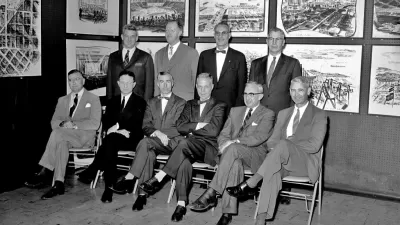Deland Chan, a lecturer in the Urban Studies program at Stanford University and co-founder of the Stanford Human Cities Initiative, makes the case for a bigger tent for planners and planning.

An article by Deland Chan suggests a new definition for the concept of "real planning" to ensure that women get more credit for the contributions to citymaking of the past, and that underrepresented groups have more of a role in the planning of the future.
For instance, Chan cites the work of "women-organized clubs that led the charge for urban beautification at the turn of the 20th century. " Plans like Charles Mulford Robinson’s General Plan for the Improvement of Colorado Springs (1912) erased the contributions of these clubs, in a familiar narrative about men consolidating and protecting their role in the making of history.
That example is a symptom of a larger problem, according to Chan—that the "planning canon, as it currently exists, reinforces a binary notion of what 'real' planning is and isn’t." While the ambitious plans, backed by institutional political and financing clout get credit, "planning from below, and 'soft,' people-centered work like community outreach, are not ascribed the same kind of value." Chan adds:
If we expanded the definition of planning, we might include Majora Carter’s workforce development and environmental justice work in the South Bronx, or Antionette Carroll’s Creative Reaction Lab, which tackles inequity in St. Louis. Carter, Carroll, and many other women leaders are not “real” (i.e. professionally trained and certified) planners, but they have shaped their cities and amplified place-based work already happening in low-income communities of color.
Finally, Chan puts out a call to action to the academic programs around the country to take a leadership role in redefining the scope of what's considered real planning:
To start, colleges and universities that make up the pipeline of future planners should rethink what they teach. It is time to recognize that our shared identity as planners is based on privileging the contributions of certain individuals and groups over others. In specific terms, institutions can reshape curricula to include missing or marginalized voices.
FULL STORY: What Counts as 'Real' City Planning?

Study: Maui’s Plan to Convert Vacation Rentals to Long-Term Housing Could Cause Nearly $1 Billion Economic Loss
The plan would reduce visitor accommodation by 25,% resulting in 1,900 jobs lost.

North Texas Transit Leaders Tout Benefits of TOD for Growing Region
At a summit focused on transit-oriented development, policymakers discussed how North Texas’ expanded light rail system can serve as a tool for economic growth.

Using Old Oil and Gas Wells for Green Energy Storage
Penn State researchers have found that repurposing abandoned oil and gas wells for geothermal-assisted compressed-air energy storage can boost efficiency, reduce environmental risks, and support clean energy and job transitions.

Private Donations Propel Early Restoration of Palisades Playground
Los Angeles has secured over $1.3 million in private funding to restore the Pacific Palisades playground months ahead of schedule, creating a modern, accessible space that supports community healing after recent wildfires.

From Blight to Benefit: Early Results From California’s Equitable Cleanup Program
The Equitable Community Revitalization Grant (ECRG) program is reshaping brownfield redevelopment by prioritizing projects in low-income and environmental justice communities, emphasizing equity, transparency, and community benefits.

Planting Relief: Tackling Las Vegas Heat One Tree at a Time
Nevada Plants, a Las Vegas-based nonprofit, is combating the city’s extreme urban heat by giving away trees to residents in underserved neighborhoods, promoting shade, sustainability, and community health.
Urban Design for Planners 1: Software Tools
This six-course series explores essential urban design concepts using open source software and equips planners with the tools they need to participate fully in the urban design process.
Planning for Universal Design
Learn the tools for implementing Universal Design in planning regulations.
Ascent Environmental
Borough of Carlisle
Institute for Housing and Urban Development Studies (IHS)
City of Grandview
Harvard GSD Executive Education
Toledo-Lucas County Plan Commissions
Salt Lake City
NYU Wagner Graduate School of Public Service





























